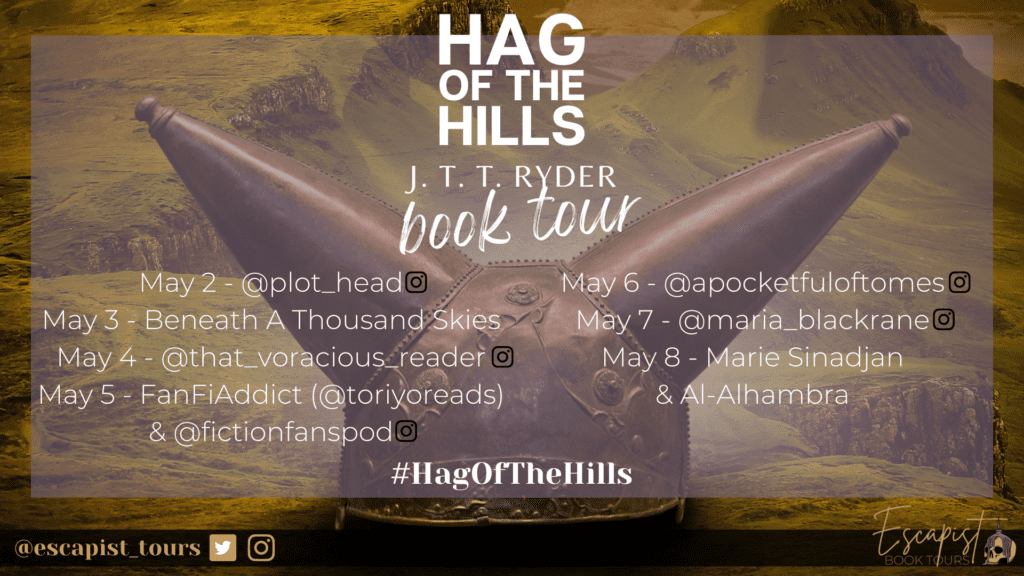
Hello, everyone! Thank you for tuning into my stop on the Hag of the Hills tour. Due to some mental health issues, I haven’t been able to finish the book yet. However, from what I HAVE read, I can say without a doubt that if you are interested in an exciting historical fantasy that feels like a combination of Braveheart and Beowulf, this book is for you. With essences of the paranormal and a compelling cast of characters, this book is a true treat for anyone who loves a good adventure.
If you would like to purchase Hag of the Hills, good news! The author has made it FREE on Amazon for a limited time—the end of the day on 05/06!
Below you’ll find information about the book and author as well as an excerpt from the exciting pages themselves!
Happy reading!
Book Information
Hag of the Hills by J.T.T. Ryder
Series: The Bronze Sword Cycles duology
Genre: Historical Fantasy
Intended Age Group: Adult
Pages: 288
Published: March 1, 2022
Publisher: Old World Heroism ENK (Self Published)
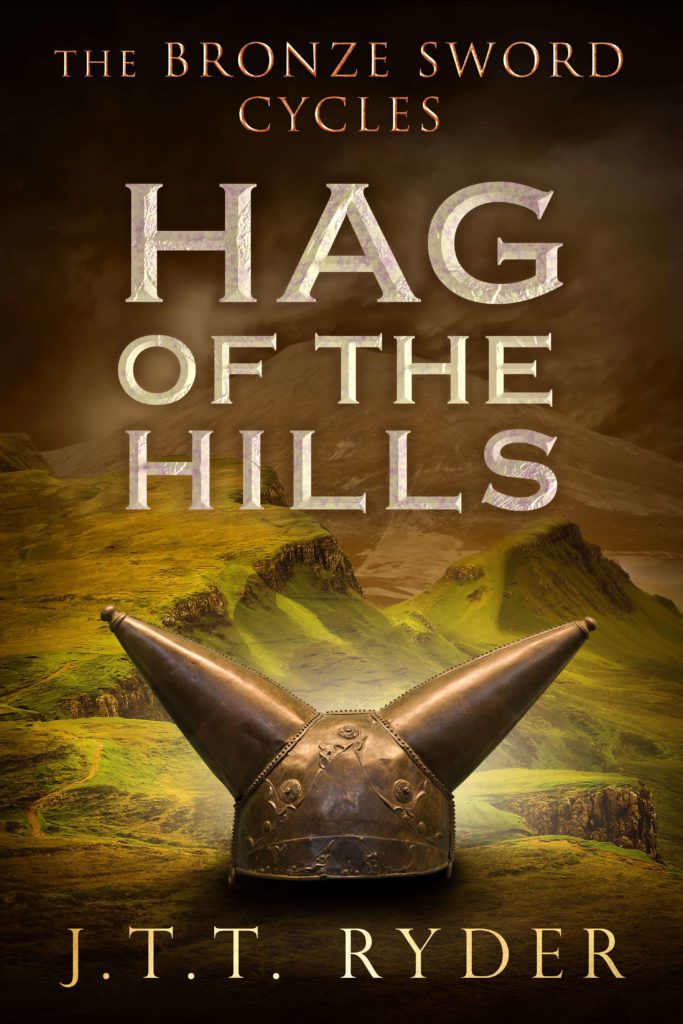
Blurb:
“Nothing is unconquerable; even our gods can die.”
All his life, Brennus has been destined for warriorhood. However, a farmer’s life doesn’t provide many opportunities for swordplay and glory, despite the Goddess of Winter’s gift of the Sight—the ability to see the sidhe of the Otherworld. But when the Hillmen kill his family and annihilate his clan, he knows the truth—no one can avenge his homeland but himself.
As he prepares to set out against the Hillmen and their Queen, the clan’s chief druid entrusts his daughter, Myrnna, to his protection, to which Brennus swears a solemn oath. As they fight toward the sanctuary of Dun Torrin, he must survive the endless hordes of Hillman and the monstrous sidhe while shielding Myrnna from harm, aided only by the Sight, a band of shifty mercenaries, and an ancient bronze sword.
As Brennus struggles through this new world of blood and magic, the tension between protecting Myrnna and avenging his homeland threatens to tear him apart. Failure means the curse of dishonour. Victory would bring glory to himself and his ancestors. But what if keeping both of his promises proves impossible?
In the words of his father…
“Nothing is unconquerable; even our gods can die.”
Hag of the Hills is the first book in The Bronze Sword Cycles duology, a heroic fantasy set in 200 B.C. on the Isle of Skye, steeped in Celtic mythology and culture.
See Also:
Welcome to the Island • We Have War and Flames • We Have Everything You Want if You Like Blood and Death
Book Links:
Amazon: https://t.co/CH2TdSPvEZ
Barnes and Noble: https://www.barnesandnoble.com/w/hag-of-the-hills-the-bronze-sword-cycles-1-jt-t-ryder/1141059703
Black Dragon Books (UK): https://www.blackdragonbooks.co.uk/shop/genre/fantasy/hag-of-the-hills-the-bronze-sword-cycles-book-1/
Excerpt:
PROLOGUE
Let the god of wordsmithing drape me with his cloak and light our night with his inspiration. I will tell you, my dearest Luceo, the tale of how I came to sit next to you at this fire, far from our homeland, after the so-called queen Slighan and her Hillmen tore it asunder. May you always recount my words at anyone’s beckoning. You are a budding bard, and your skill will wilt if your attention wanes.
A bronze sword strapped to my side, my feet caked in wet sand, the cold air on my warm face. I rode the world that day, down the strand against the Hillmen, and many crumpled before me. Even if you were to betray me, dearest Luceo, and wrought a lie from this tale, none could deny I struck true with my sword and spear that day.
In the span between Lughnasa and Samhain I had been a different man. In the grey tomb, I buried my soiled clothes, and the darkness of the tomb birthed a new man on a young day, out of the clothes and bronze and glory of my long dead ancestor.
My name is Vidav, but it had not always been so. Let it be known to all that one must rip himself from himself to form anew. Even still, as the new man walks, parts of the old one shadows him. Past features of him remain in me, just like the features of my father live on in my face, even if he is dead.
I bear bronze, a new soul, and both a gift and a curse. The latter is the ability to see the sidhe – the beings from Otherworld that often lurk in ours. This has brought both misery and glory upon me, ever since the hag had lured me into the hills.
Now I shall tell you how I first scaled the Slighan Hill, and why I would ever agree to the conditions the hag had offered me. I do not regret my choice. It has brought me men, a sword to kill my enemies, and honour back to my name. To attain that honour, I waded through briars of torment, deceit, and anguish. I saw what no mortal man should ever see, and all the gods above and below, and the sidhe that inhabit every glade, glen and grove, and every malign sidhe that inhabits every wind, snow and bog, could not
have inflicted worse upon me. Yet I trudge on, through this thorny path, and I will free Skye from this foreign tyranny.
Now I shall start from the beginning, my dear Luceo, before I had killed myself.
CHAPTER I
Come to the Slighan Hill…
Slighan Hill loomed over the land. She drew all eyes onto her gargantuan form. She stood as a shadow in the sky, a silhouette of red no matter how far one may stray from her, ever-present on her side of the island of Skye. Skye is my home, and even if I long for its long summer days of hunting seal and stag and fishing for salmon, I still take solace in that I am now away from that hill.
The inhabitants of the moors, headlands and bays that surround her dwelled in her shadow. We drank from the streams that came down from her like breastmilk, and edged close to her during the summer when we milked our cattle, yet we all heard the tales and steered clear from the Slighan Hill. The hag of the hills haunts there, and she will eat you up.
I never knew anyone who surmounted her. It was possible; she was not too steep, and covered in a clutter of boulders that could be climbed. No one except a lad named Brennus ever scaled the boulders, and they say the hag ate him up, too.
‘That strange rock’s visible today – I’ve heard the vates say she was a princess from far away – maybe Halogoland. Turned to stone because she missed her home so much. Those vates discern the will of the gods from the flights of birds and patterns of entrails and suchlike, so I don’t know if their word can be trusted on this history,’ said my bronze-skinned neighbour. His sheep brayed around him. He stood with my other neighbours on a hillock, next to a cart packed with fleeces.
I approached them. I carried a bucket of flounder, freshly caught from the coast. I eyed a fleece in the cart. The breeze ruffled it.
The other man scratched his grizzled face with his horned crook. ‘Why, I once heard a bard say – you know, bards remember all histories and suchlike – that she was a queen of the giants. Giants ruled Skye, and they and their queen waged war against man. But our ancestors invaded Skye, fought against the giants and won, then drove them into the sea. The gods
punished the giant queen – turned her flesh into stone, like a caterpillar in its cocoon, and like the caterpillar, she will emerge from her cocoon as something new.’
I set the bucket of fish down and eyed the hill. Parents raise their children around here on these legends. I heard them around the hearth in my home late at night from relatives and neighbours. The legends made me shudder or ponder but I always yearned for those nights; cockles and crab and ale and mirthful tales. I yearned to hear them again, even though I had heard them all, and knew now most of them were wrong.
‘You know,’ said the bronze-skinned man, ‘the druids – keepers of all law both man and god – say that when that stone falls down, and shatters, the giants will return from the sea, and wage war against man.’
‘Fish for the fleece?’ I asked.
The man leaned on his crook. ‘Aye. You’re going to need a fleece. Best have Auneé line your jacket with it. Winter’s going to be cold this year. The vates say it’s because of the way the geese are flocking, the salmon swimming, and bucks locking antlers.’
I thanked them, emptied the bucket into one of theirs, took the fleece and was on my way back home. I crossed the red moors, my bare feet passed through a cold stream, and then when my neighbours faded behind the hillock, the voice returned.
Come to the Slighan Hill…
The voice. That crackling, strained, near-whisper that has haunted me since the day I reached nine Samhains. It always comes on a clear, blue day, when one could watch the eagles dive, and when the sun sets the heather alight in gold, and the clouds pass over and send giants of shadows across the distant, treeless moors. That is when the voice passes through me.
‘Badb! Macha! Fea!’ I prayed the three names of the Morrigan, goddess of death and battle. The clouds had parted for the sun which cast a shadow over me. Slighan’s shadow. I stood far away from the mountain, yet still in her shadow.
Everyone on Skye always stood in her shadow.
At the time, I lived the life of a Skye freeman, though my family is of warrior blood. I woke before dawn, went to the shore, and there I collected bait, driftwood, shellfish, fished, and then I came home and fed the pigs. 5
I oversaw the slaves who worked in the wheat field and garden. I visited neighbours and traded. There were tasks to do, such as fixing a bedpost here, slaughtering a sick piglet there, or cutting peat for the hearth.
After supper, we would dance and play music, throw stones, fence with wooden swords, ride our horses, and in the summer, trek up to the common grazelands to find the neighbouring girls. We often went to Dun Ashaig, the ramparted fort near the bay. The druids, vates, and bards lived there. We carried our wares there to trade, and we often met foreign merchants who told us news of the world. It was a good, tedious life; since we lived so far from the centre of our realm of Taman, those seeking to take land, power, and women rarely bothered us.
I went to Lugus’ cave where my forebears smithed since they arrived on Skye. My brother Fennigus, the middle of our line, often worked hard in Lugus’ cave. He was in there now, and as I trudged up the red moorland, I heard the echoing dings of the hammer. It was named after Lugus, god of crafts, the patron of our family, and the first father of our lineage.
The cave lit the dark day red-yellow. My brother Fennigus, blackened, shirtless, sweaty, swung the hammer in the smoky cave. I approached. He squinted his eyes as the hot iron yellowed. He turned, lifted the iron with his tongs, and sank the iron into a pile of coal. I watched on. He placed the blade back onto the anvil and struck again.
The world knew our father as both ironsmith and warrior. He adventured around the world until he died somewhere in a place called Scythia. It was not uncommon for foreigners who visit our island to have known him. Father only visited the island a handful of times since we live on the western edge of the world, and each time, he taught me something I have never forgotten.
Fennigus, smudged with coal, shirtless and beaded in sweat, banged the glowing iron. He stood taller than I, with dark blond hair, and his muscles corded as he worked. He slid the iron blade off the anvil and stuck it into the vat of water again, where it sizzled. The air was smoky, the ground ashy, and one of our slaves idled near the grazing horse nearby.
‘We’re going on a cattle raid,’ he said, without looking at me. He placed the iron back on the anvil and hammered at it. The ringing pounded in my ears. ‘You should come.’
‘Bodvoc would kill me,’ I said. Bodvoc was our eldest brother, and he acted much like a father towards me. He was much older, and he had a
foreign wife. He permitted me to be neither ironsmith nor warrior. He contended that I ought to wed the neighbour girl and inherit the land.
‘You need to find your balls,’ Fennigus said, wiping black sweat from his brow as he hammered. ‘We stand in Lugus’ cave – come on, we are descended from him. You cannot fight and you cannot smith, what sort of son of Lugus are you? We’re warriors, but Bodvoc made you into his slave.’
I longed for the cattle raid. It was the way of our people – we have farming season and raiding season. We farm and eat in the farming season, and then we’re starving in the raiding season, so we go and take the cattle from someone else to feed ourselves – and then they starve. Often all winter we raid each other’s farms, and steal cattle and then they come and steal it back, then we get angry and steal it back again and this lasts all winter. The raids had been infrequent lately, though, since the druids at Dun Ashaig made peace with our neighbouring clans. But Fennigus and his boys still went raiding.
‘Did the druids approve of the last raid?’ I asked.
‘The druids have been acting weird lately. They’re not letting us fight, not even the enemy clans.’
‘Auneé doesn’t like druids,’ I said. Auneé was Bodvoc’s wife. She was skilled in the healing arts, and had a distrust of druids.
‘No one likes them. They claim to discern the will of the gods, but it’s the vates that do the real work. Anyway, something is going on. Rumour has it that the head druid, you know, Ambicatos, with the dark-eyed daughter – the one with the big tits – has been attracting some strange visitors to Dun Ashaig. They have a suitor for her, but her father won’t wed her. I don’t know what’s going on, but once they came around, the druids have been forbidding fighting against other clans, enemies or otherwise. But that Skeane boy – you remember the little mouse – pissed me off, so we’ll steal a cow or two. We’re off tomorrow. Coming?’
‘He’s not,’ said a voice from behind us. It was Bodvoc. He had salty dark hair and an old man’s gizzard neck. He had stubby arms and legs but broad shoulders and a back so strong you could haul three full bags of grain on his shoulders and he’d ask for another. He was huffing after he had trudged up the moorland to the cave. A hairless slave accompanied him, shirtless, with a woollen collar around his neck.
‘Stupid business, this raiding is.’ he said between heaves, leaning over to catch his breath, he continued, ‘we get raided – then what? No boys of ours left to fight. All lame, maimed or dead. Useless.’
He straightened himself, sucked in a long breath and walked through the thick ash of the smithy. ‘You’re not doing it right,’ he said to Fennigus.
Fennigus brandished the bright yellow blade that sparked. He dipped it into the vat of water, and the hiss filled the cave. He lifted it out, took it in his brown gloved hand and whacked the spearhead against a rootless tree stump next to his bare feet.
He had been working on a spearhead for days. Father had shown him the secret of iron last time he was here. Back then, Fennigus was just twelve and I nine, and only on the winter solstice, when the sun winked across the broadside of Lugus’ cave, could Fennigus learn to smelt iron. I had not been present at the ritual, but a friend of Fennigus’, Sego, spied on them and watched the whole thing. He said they both donned wolf masks so that their faces became the faces of wolves and they howled all throughout the night.
Fennigus’ muscles contorted as he hammered away at the spearhead.
‘It’s too hot. You’re too rough with it,’ Bodvoc said, and snatched away the tongs from Fennigus and hammered it himself. Fennigus funnelled air into the forge, the flames stretched upward, and Bodvoc stuck the spearhead into the burning coal. Father entrusted us to Bodvoc, and Bodvoc ought to be listened to. We should have both respected that more, since he had a lot to teach us, and he was a good and just foster father.
I spotted the cairn in the distance. The weather on Skye, compared to other lands I’ve visited since my youth, was awful, with rain and fog and seldom can one see far away. Even mountains were obscured for days or weeks and travellers often never realized that they are even there at all. On this day, the weather had been clear for some days, which was all together unusual, and I don’t think any of us had a good feeling about it. On this day, the cairn stood stark against the moors. I walked down the hillock to the cart and fumbled with the yoke.
The cairn looked as if it had struck into the sky from its burial mound, green-white bump against the black mountains, the Cuillins, behind it. Our people bury our dead in the sky; we place them on platforms or in trees and the birds pick them clean so they may leave the world for the next in haste. In the olden days, we buried heroes in great mounds, covered in stones,
at roadsides, or waterways, harbours, or passes, so that all travellers may know their silent heroism. This cairn here, at the trackway, was upon such a mound. What sort of hero deserved a burial as that?
Bodvoc had followed me down, shirtless and sweaty, and he grabbed the yoke and lectured me about how to tie a new one to replace the one that had frayed. I had little attention to pay him as I thought about the cairn. It must have been a grand man under the cairn, who had left such an impact on this world that his followers heaped earth upon his body.
I bet father has a mound somewhere in Scythia. The Scythians love to erect mounds. When a Scythian lord dies, his men and horses are all killed with him and the whole company is propped up upon the mound in a grim assembly until the children of the Morrigan satisfy their palates. My father must have had such a funeral.
Bodvoc’s meaty knuckles cuffed me on the head.
‘I’m sorry, Bodvoc, I promise I’ll pay attention.’
Bodvoc turned his sweaty, hairy back to me and marched back up the hillock to the smithy. I followed and eyed the long scar on his shoulder.
I ventured back to the darkness of the overturned boulder, where the ground became ash-softened and glowing iron lit the way. A skull was pegged to the back of the wall of the boulder by an iron nail, and I knew him as a nameless ancestor of ours. I started to sweat, and took my tunic off.
Bodvoc held Fennigus’ sword now, his squinted eyes checking every detail. He stroked his greying moustache. Fennigus’ sword came from the sidhe, so to say. When a young man turns thirteen Samhains, he must go and find a sword. I don’t know where the swords come from, since it’s a secret kept by the sword-armed boys, but I’ve heard they come from bogs or lochs or old tombs, gifted by the sidhe of those places. Bodvoc and Auneé forbade us from partaking in this ritual, even though it is our birthright, but Fennigus snuck out one night and returned in the morning with an iron sword. Sometimes, the boys bring back bronze swords, though those are probably ill luck, cursed weapons from a bygone before men knew the magic of iron.
‘Not bad. I would take it into battle,’ said Bodvoc as he hefted the blade, ‘I always thought of myself with this in my hand. Another stuck in my chest. Used to think that was the death. Now I’ll be happy to die in my bed, when I am no longer useful for our world of Taman.’
About the Author:
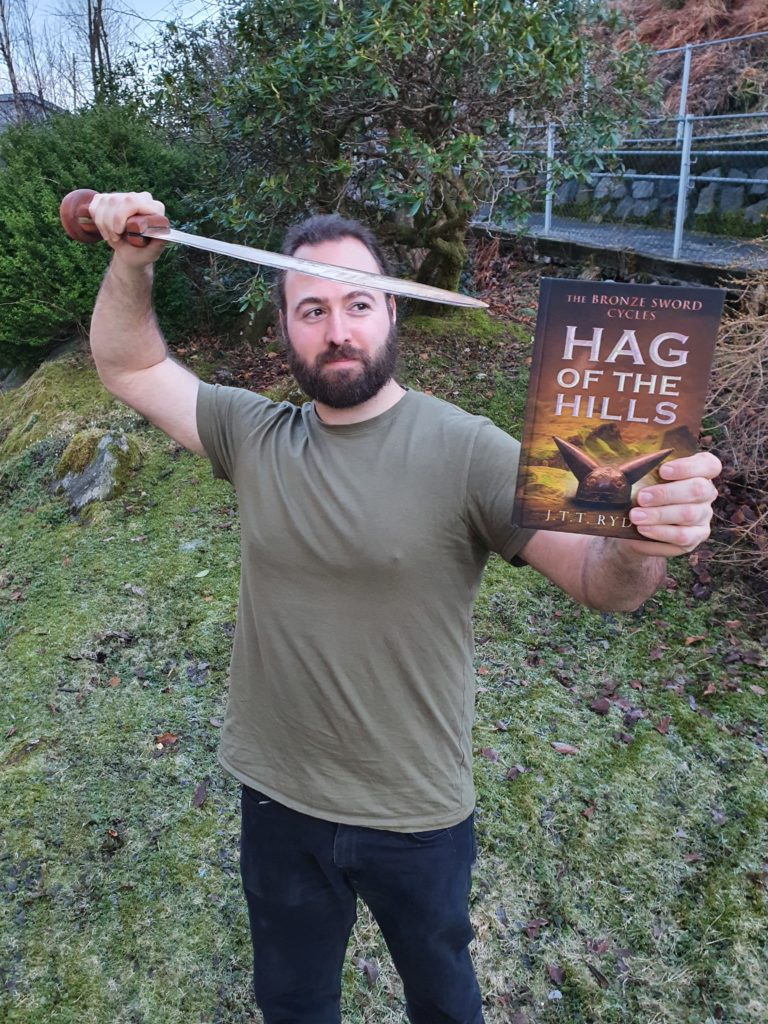
J.T.T Ryder is an archaeologist and author of the heroic fantasy novel HAG OF THE HILLS, book 1 of THE BRONZE SWORD CYCLES duology. He is a published author of Viking archaeology, and a doctoral candidate specializing in the Viking Age and Celtic Iron Age. He resides in Norway where he conducts archaeological research and writes heroic fantasy set in historical periods.
Social media links:
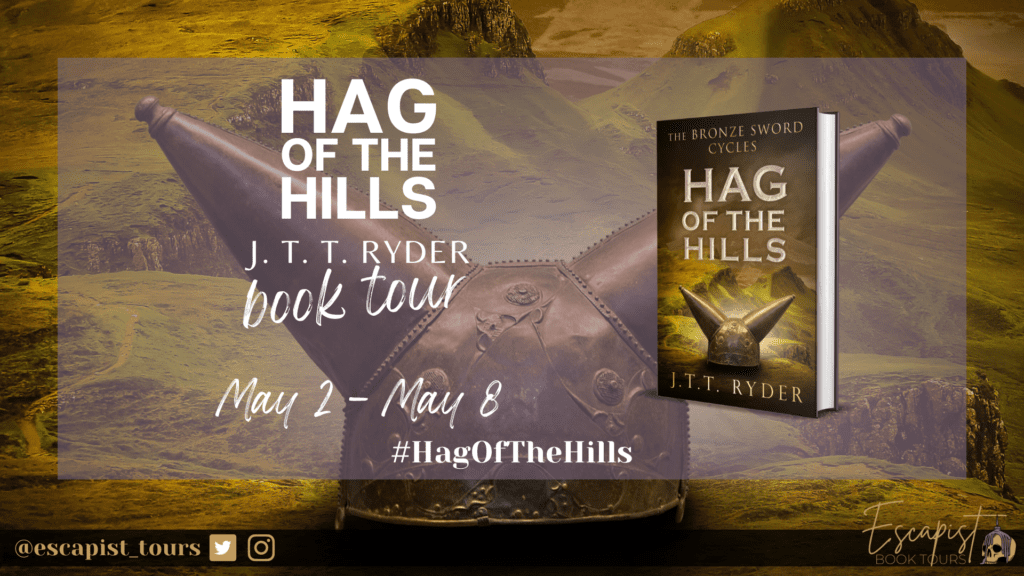

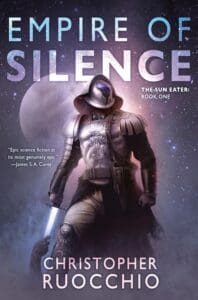
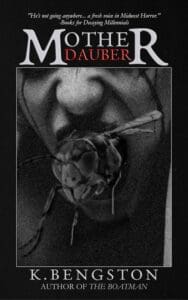
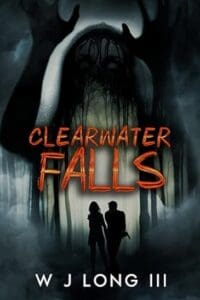
Leave a Reply